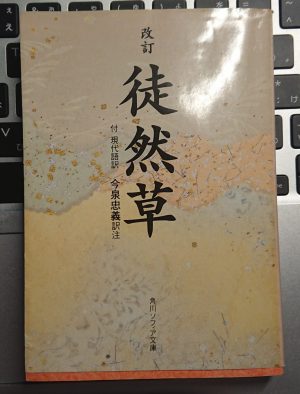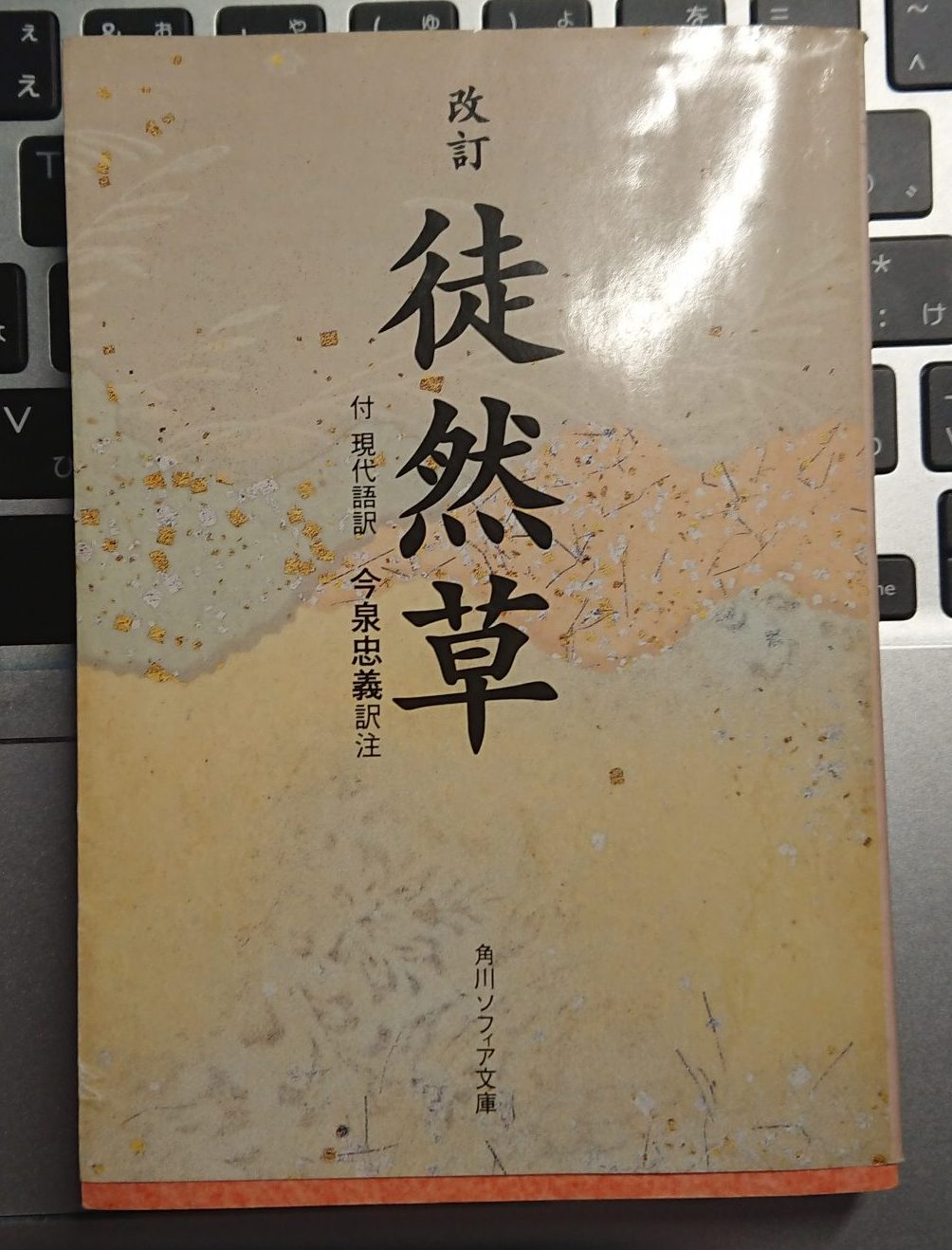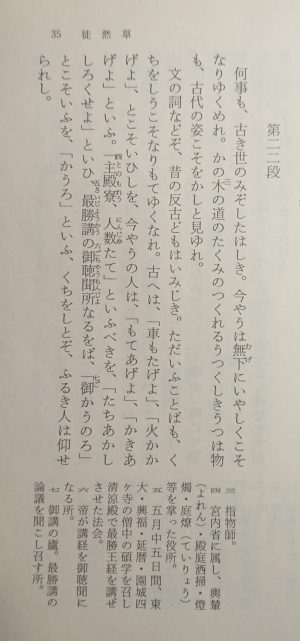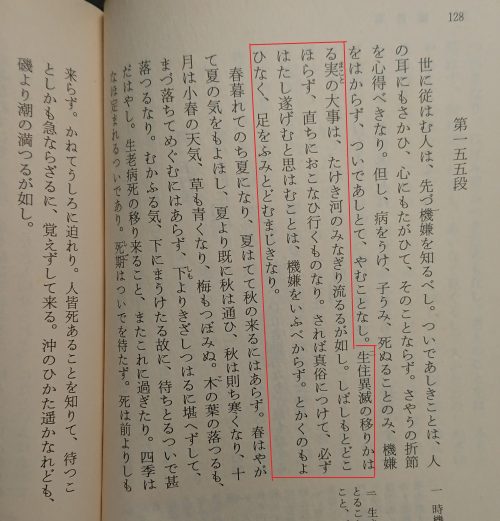※日本語は英語の下に記載しています。
This is the continuation of last post.
At that time, when I remembered “Mononoaware”, it remined me “Tsureduregusa – Essays in Idleness”, a Japanese ancient essay, then I felt like reading it.

I might haven’t read this since I read this once, when I was a teenager. Basically, I’m not good at ancient Japanese language class, besides I’m not really good at memorizing. So as for me, the grammar conjugation looked like same verbs when I learned it.😅
However, I was interested in the sounds of sentence and the era and culture. But about the most popular books,
Genji monogatari→I don’t like dark and heavy love story.
Makuranososhi→I don’t like the author who looks like being proud of her intelligence too much.😝
likewise, because of these my prejudice, it makes me to away from reading them but I like collection of wisdom stories.
When I knew about Essays in Idleness at first was at a class in junior high school, I got same feeling with this book. Especially, I like how to understand nature and this philosophic taste very much. This paper book has present Japanese translation also and I read the present language of course. 😆
Then, a minutes later when I started to read, I found a story feel like “!” in my mind.
Story No. 22
About the first sentence, it means “I feel like missing old time about anything. This era looks luck of elegance in any case, anyway.”, then he continues that the ancient design of goodies look lovely and the words of letter in old era are better than present so far. Now the pronounce was changed and they cut words too much.
This is same as what ‘Midnight in Paris’ says!
Netfilix is here.
The main character believe 1920’s Paris is the best golden era. (I love Jazz and Oldies so I feel same very much.) He has nostalgic idea.
This movie’s director also write this scripts. So it can be said he is the director, himself.
Then an idea came up in my head. These two persons live in different era and country but they say same thing.
Essays in Idleness shows “Mononoaware”, what is called “awareness of impermanence” and the time is passing and changing so life is fleeting.
The main character says “The present is unsatisfied, because the life is unsatisfied.”
Besides, Essays in Idleness says also this;
Story No. 155 summery is “Time is passing by, momentary and changes come suddenly.”, and the red box part means “So if you want to success in anything of your religions event or life, don’t plan it, hesitate to do it. Don’t worry too much and stop your walking.”
The main character continues “If I ever wanna write something worth while after, you do get to lose your illusion.”
After all, he means you are unsatisfied in present so you look past great. But the important thing is to live your life now and change it, I think.
The author of Essays in Idleness is Kenko Hoshi(Monk) , his another name is Kaneyoshi Urabe lived from 1283 to 1350, in Kamakura era and he was born in Kyoto, Japan and stayed in Kamakura and Kanazawa, Kanagawa prefecture for a long time.
On the other hand, the director of Midnight in Paris, Woody Allen was born in December 1st, 1935. He was born in New York, USA and grow up in New York. He has act in New York now.
These two persons live in different era and place at all. Their belief is different, too. Buddhism and Judaism. But they have similar idea of life.
It is said that there is European idea and Oriental idea in studying, and also in culture, the roots of ideas are categorized like this. So they don’t agree or they can’t understand each others because of the difference of cultures. But I have wonder often against this idea. In fact, the idea is quite different in Orient and Europe, but they are same creature, human. So what emotions they have and how they feel in basic are same, I think.
How to show is different but everyone must angry if someone makes fun of them and must be happy if someone says thank you to them.
The emotion in the base are same. in spite of it, it must not be impossible to understand each others.
In the world, there are may types of religions but their idea of base, what they look as important are same, I think.
So I believe to understand each other at first even though if they look different from you.
I felt internets in Essays in Idleness, when I read it again now. But I don’t agree with every author’s opinions and he shows different two idea for a one theme, it makes me feel contradiction often.
It is hesitate to say that I read afterword now, it says he wants to tell you should look at anything in many ways. So this book is called “Japanese philosophy book”. I agree with it.
Others, there are many stories in this book that will make you nod or ring more strings of your heart especially in this COVID era. Please try to read this, if you like!
NOTE:But on the other hand, if we look at Essays in Idleness from the other side, it looks to agree with to understand anything as we like, depending on each situations. If the answer came from this idea is not problem for anyone, it would not be problem but if not so, the answer may have tendency to be opportunism or double standards. However, it may be not problem if all of them in that situation have same belief or core of principle. In antient Japan, there was Buddhism as core of principle. But if we look at present Japan, it looks to leave the shape and doesn’t match with today’s social. This phenomenon seems to have started since Meiji era. Then because the core of principle exist or not, apparently there are difference between Japan and the other countries. About this point, I’m going to describe in another time.
前回の続き。
その時、「もののあはれ」という言葉から徒然草を思い出して、ひさしぶりに読んでみたくなった。

中高生の時に、一度読んで以来かも。元々古文は得意ではない。そもそも暗記が大の苦手で、古文の文法の活用とか、途中から全部同じに見えた。😅
でもその文章の語感とか、その時代とか文化には興味があった。でも有名な作品は、
源氏物語→ダークで恋愛中心の小説が苦手。
枕草子→作者の知識ひけらかす感があまり好きじゃない。😝
という勝手な偏見で、読みたい気持ちにならないのだが、説話集とかは好きだった。
最初に古文の授業で徒然草を知って、その内容に共感したからだと思う。特に自然観とか哲学的な部分が好きだった。この文庫本は現代日本語訳が付いてて、読んでいたのはもちろん現代語の方。 😆
そして読み始めてからしばらくして「!」という話を見つけた。
第二十二段
最初の文の意味は「何事につけても昔の世の中ばかりが慕わしく感じられる。何事も当節は要するにいよいよ上品さに欠けるようになってきているようだ。」、そして古代式の作り物の方が趣を感じる、手紙の文句なども昔の方が反古でも実に優れている、今は発音が変わってしまったり、省略しすぎると。
これって映画の「ミッドナイト・イン・パリ」で言ってたことと同じだ!
主人公は1920年代のパリが一番の黄金時代だと思っている。(私もジャズとかオールディーズが好きだからとても共感。)懐古主義的な考えを持っている。
この映画の監督は人物でこの作品の脚本も書かれたそう。なのでこの主人公は監督自身でもあるそうです。
そこでふと思ったのです。全く異なる時代と国であるのに同じことを言っていると。
そして徒然草は「もののあはれ」という無常観を表していると言われる。つまり、時は移ろいゆくもので、人生ははかないと。
ミッドナイト・イン・パリの主人公は「“現在”って不満が多いもの。でもそれが人生だから」と語る。
さらに徒然草ではこうも言っている。
この第一五五段は簡単にまとめてしまうと「時はあっという間に過ぎるものだ。そして変化は突然訪れる。」という内容で、赤枠部分の現代語訳は「だから宗教上のことでも世俗のことでも成し遂げようと思うことは、時期を見計らったりしてはいけない。かれこれ心づかいをすることなく、足を踏みとどめていてはならない。」という意味である。
ミッドナイト・イン・パリの主人公はさらに続けて、「何か価値あるものを書こうと思うなら過去への幻想は捨てるべきなんだ。」と語る。
つまり、現在に不満を持っているから、過去が良く見えてしまう。でも大事なことは今を生きる、変えていくことなんだと語っているように思える。
徒然草の作者である兼好法師(卜部 兼好/うらべ かねよし)は弘安6年(1283年)ごろから観応元年(1350年)の主に鎌倉時代の人物だと言われており、京都で誕生してから、今の神奈川県の鎌倉や金沢区あたりに長く滞在していました。
一方、ミッドナイト・イン・パリの監督である、ウディ・アレンは1935年12月1日、アメリカのニューヨーク生まれ、ニューヨーク育ち。ニューヨークを拠点に現在もご健在です。
生きた時代も場所も全く異なる。宗教も全く違う。仏教とユダヤ教。でもふたりとも同じような価値観を持っている。
よく西洋思想とか東洋思想とか学問だけでなく、文化のルーツもそんな分け方をされる。だから意見が合わないとか、文化が違うから理解し合えないとか。でもしばしばそんな考えに疑問を持つ。確かに東西において思想はかなり違うけど、元は同じ人間という生物ではないかと。だから基本的に持つ感情や感情の受け取り方は同じじゃないかと思う。
表現方法は異なる、でも誰だって馬鹿にされたら怒るし、感謝されたら嬉しいと思う。
根底にある感情は同じだ。それなのに分かり合えないことはないはずだ。
宗教も色々あるが、根本にあるもの、大切にしていることは同じだと思う。
だから、異なるものであっても、まず理解しようとすることが大事だと思うのだ。
徒然草は今改めて読んでみると面白い。でも作者の意見に全部賛成する訳ではないし、同じテーマでAとBと違う見解を示しており、矛盾的を感じる部分も多々ある。
今更になって後書きを読んだのだが、作者が言いたかったことは、同じものであっても多面的な見方をすべきだということらしい。だから日本の哲学書と言われるのだそう。なるほど、納得。
他にも、なるほどという話、このコロナ時代だからこそさらに響く話が一杯書かれている。良かったら読んでみてくださいね!
※補足:でも徒然草を別の面からみると、状況に応じて都合の良いように解釈することを肯定しているようにも見える。それって、その判断が誰に対しても問題なければいいけど、そうでないとご都合主義になる傾向がありそうに思える。でもこれは全ての当事者が同じ信条や原理の軸を持っているのであれば、その判断は問題ないのかもしれない。日本にも昔は仏教が原理の軸としてあった。でも日本の現状を見ると、形だけ残って、それが当てはまらないように見える。その現象は明治時代以降から始まっているようだ。そしてその同じ原理の軸があるかないかが、今の日本と海外の差にあるように見える。こちらについてはまた別の回で詳しく検証したいと思います。







コメント